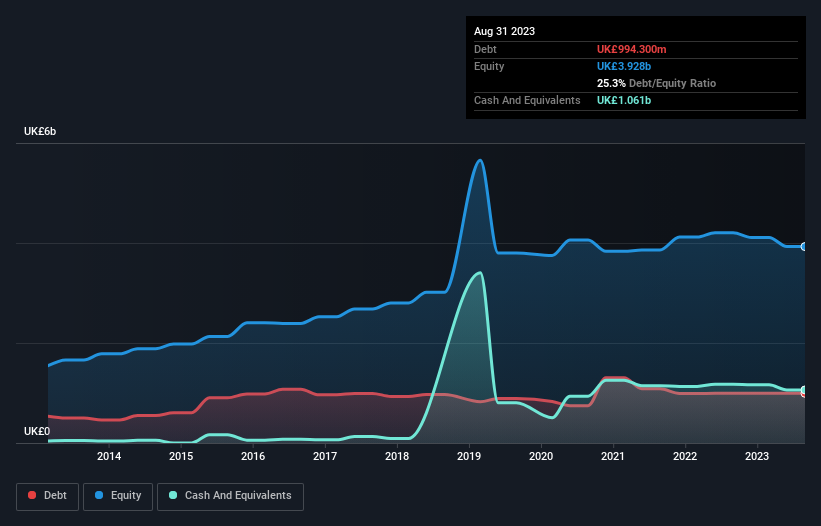- United Kingdom
- /
- Hospitality
- /
- LSE:WTB
These 4 Measures Indicate That Whitbread (LON:WTB) Is Using Debt Reasonably Well

Howard Marks put it nicely when he said that, rather than worrying about share price volatility, 'The possibility of permanent loss is the risk I worry about... and every practical investor I know worries about.' So it might be obvious that you need to consider debt, when you think about how risky any given stock is, because too much debt can sink a company. We can see that Whitbread plc (LON:WTB) does use debt in its business. But is this debt a concern to shareholders?
When Is Debt A Problem?
Debt and other liabilities become risky for a business when it cannot easily fulfill those obligations, either with free cash flow or by raising capital at an attractive price. Part and parcel of capitalism is the process of 'creative destruction' where failed businesses are mercilessly liquidated by their bankers. While that is not too common, we often do see indebted companies permanently diluting shareholders because lenders force them to raise capital at a distressed price. Of course, debt can be an important tool in businesses, particularly capital heavy businesses. The first step when considering a company's debt levels is to consider its cash and debt together.
Check out our latest analysis for Whitbread
How Much Debt Does Whitbread Carry?
The chart below, which you can click on for greater detail, shows that Whitbread had UK£994.3m in debt in August 2023; about the same as the year before. But it also has UK£1.06b in cash to offset that, meaning it has UK£67.0m net cash.

A Look At Whitbread's Liabilities
Zooming in on the latest balance sheet data, we can see that Whitbread had liabilities of UK£852.9m due within 12 months and liabilities of UK£5.00b due beyond that. On the other hand, it had cash of UK£1.06b and UK£123.8m worth of receivables due within a year. So its liabilities outweigh the sum of its cash and (near-term) receivables by UK£4.67b.
This is a mountain of leverage relative to its market capitalization of UK£6.54b. This suggests shareholders would be heavily diluted if the company needed to shore up its balance sheet in a hurry. Despite its noteworthy liabilities, Whitbread boasts net cash, so it's fair to say it does not have a heavy debt load!
It is well worth noting that Whitbread's EBIT shot up like bamboo after rain, gaining 31% in the last twelve months. That'll make it easier to manage its debt. When analysing debt levels, the balance sheet is the obvious place to start. But it is future earnings, more than anything, that will determine Whitbread's ability to maintain a healthy balance sheet going forward. So if you want to see what the professionals think, you might find this free report on analyst profit forecasts to be interesting.
But our final consideration is also important, because a company cannot pay debt with paper profits; it needs cold hard cash. Whitbread may have net cash on the balance sheet, but it is still interesting to look at how well the business converts its earnings before interest and tax (EBIT) to free cash flow, because that will influence both its need for, and its capacity to manage debt. During the last two years, Whitbread produced sturdy free cash flow equating to 67% of its EBIT, about what we'd expect. This free cash flow puts the company in a good position to pay down debt, when appropriate.
Summing Up
While Whitbread does have more liabilities than liquid assets, it also has net cash of UK£67.0m. And we liked the look of last year's 31% year-on-year EBIT growth. So we don't have any problem with Whitbread's use of debt. The balance sheet is clearly the area to focus on when you are analysing debt. But ultimately, every company can contain risks that exist outside of the balance sheet. Be aware that Whitbread is showing 1 warning sign in our investment analysis , you should know about...
If you're interested in investing in businesses that can grow profits without the burden of debt, then check out this free list of growing businesses that have net cash on the balance sheet.
If you're looking to trade Whitbread, open an account with the lowest-cost platform trusted by professionals, Interactive Brokers.
With clients in over 200 countries and territories, and access to 160 markets, IBKR lets you trade stocks, options, futures, forex, bonds and funds from a single integrated account.
Enjoy no hidden fees, no account minimums, and FX conversion rates as low as 0.03%, far better than what most brokers offer.
Sponsored ContentValuation is complex, but we're here to simplify it.
Discover if Whitbread might be undervalued or overvalued with our detailed analysis, featuring fair value estimates, potential risks, dividends, insider trades, and its financial condition.
Access Free AnalysisHave feedback on this article? Concerned about the content? Get in touch with us directly. Alternatively, email editorial-team (at) simplywallst.com.
This article by Simply Wall St is general in nature. We provide commentary based on historical data and analyst forecasts only using an unbiased methodology and our articles are not intended to be financial advice. It does not constitute a recommendation to buy or sell any stock, and does not take account of your objectives, or your financial situation. We aim to bring you long-term focused analysis driven by fundamental data. Note that our analysis may not factor in the latest price-sensitive company announcements or qualitative material. Simply Wall St has no position in any stocks mentioned.
About LSE:WTB
Whitbread
Operates hotels and restaurants in the United Kingdom, Germany, and internationally.
Good value with adequate balance sheet and pays a dividend.


